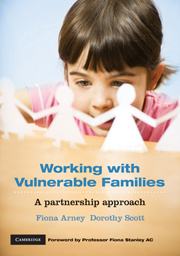Book contents
- Frontmatter
- Foreword
- Contents
- List of figures, tables and boxes
- Contributors
- Acknowledgements
- Introduction
- Chapter 1 Think child, think family, think community
- Chapter 2 Family strengths: an international perspective
- Chapter 3 Harnessing ‘resilience’ when working with children and families
- Chapter 4 Working within and between organisations
- Chapter 5 Family-centred practice in early childhood settings
- Chapter 6 Sustained nurse home visiting with families of Aboriginal children
- Chapter 7 Including fathers in work with vulnerable families
- Chapter 8 Parenting in a new culture: working with refugee families
- Chapter 9 Responding to parents with complex needs who are involved with statutory child protection services
- Chapter 10 Engaging family members in decision making in child welfare contexts
- Chapter 11 Supporting parents whose children are in out-of-home care
- Chapter 12 Using evidence-informed practice to support vulnerable families
- Chapter 13 Spreading promising ideas and innovations in child and family services
- Index
Chapter 2 - Family strengths: an international perspective
- Frontmatter
- Foreword
- Contents
- List of figures, tables and boxes
- Contributors
- Acknowledgements
- Introduction
- Chapter 1 Think child, think family, think community
- Chapter 2 Family strengths: an international perspective
- Chapter 3 Harnessing ‘resilience’ when working with children and families
- Chapter 4 Working within and between organisations
- Chapter 5 Family-centred practice in early childhood settings
- Chapter 6 Sustained nurse home visiting with families of Aboriginal children
- Chapter 7 Including fathers in work with vulnerable families
- Chapter 8 Parenting in a new culture: working with refugee families
- Chapter 9 Responding to parents with complex needs who are involved with statutory child protection services
- Chapter 10 Engaging family members in decision making in child welfare contexts
- Chapter 11 Supporting parents whose children are in out-of-home care
- Chapter 12 Using evidence-informed practice to support vulnerable families
- Chapter 13 Spreading promising ideas and innovations in child and family services
- Index
Summary
Learning goals
This chapter will enable you to:
Understand the key propositions derived by family strengths researchers around the world over the past four decades and see how these ideas can be used to help strengthen families at times of vulnerability
Learn about the major qualities of strong families: appreciation and affection, commitment, positive communication, enjoyable time together, spiritual well-being, and the ability to manage stress and crisis effectively
See how family strengths, community strengths and cultural strengths interrelate from a global perspective, and how these resources can be used to support vulnerable families in positive ways
Find a realistic answer to parents who ask: ‘Is there hope for me and my kids? I did not grow up in a strong family, but a terribly troubled family. Will I be able to parent my children successfully?’
Understand how research on family strengths, community strengths and cultural strengths can be applied directly in the lives of individuals and families.
Introduction
Considerable effort around the world over the past four decades has gone into the study of strong families. Motivated by a rising tide of divorce and family disruption in the US in the 1960s and 1970s, researchers began focusing on the broad question of why families fail:
Why do relationships that begin in love end in divorce?
Why do parents abuse their children?
Why do spouses abuse their partner?
[…]
- Type
- Chapter
- Information
- Working with Vulnerable FamiliesA Partnership Approach, pp. 29 - 48Publisher: Cambridge University PressPrint publication year: 2010
- 4
- Cited by



